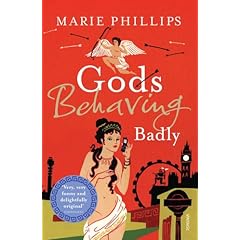 --The blurb--
--The blurb--"Being a Greek god is not all it once was. Yes, the twelve gods of Olympus are alive and well in the twenty-first century, but they are crammed together in a London townhouse-and none too happy about it. And they've had to get day jobs: Artemis as a dog-walker, Apollo as a TV psychic, Aphrodite as a phone sex operator, Dionysus as a DJ. Even more disturbingly, their powers are waning, and even turning mortals into trees--a favorite pastime of Apollo's--is sapping their vital reserves of strength. Soon, what begins as a minor squabble between Aphrodite and Apollo escalates into an epic battle of wills. Two perplexed humans, Alice and Neil, who are caught in the crossfire, must fear not only for their own lives, but for the survival of humankind. Nothing less than a true act of heroism is needed-but can these two decidedly ordinary people replicate the feats of the mythical heroes and save the world?"
from www.hachettebookgroup.com
--The review--
The popularity of Classics and classical studies has waned during my lifetime, with fewer and fewer people choosing to take it up at GCSE, A Level, and at university, and with even fewer of these opting for the ancient languages. Leaving Latin and Ancient Greek out of it, it is a little difficult to understand why this is, given the popularity of modern history courses. Are courses centred around the ancient world considered too hard, too useless, not well-known enough, or simply too boring?
The usefulness of classical studies is not immediately obvious, but given that it bears the roots of modern politics in particular, certain practical applications become clear, especially when one considers such political documentaries as "The Power of Nightmares", wherein director Adam Curtis refers to Plato, and such political texts as Karl Popper's The Open Society and its Enemies. Too hard? Surely no harder (or in fact more boring) than modern history. Not well-known enough I can perhaps accept. Thankfully, however, several modern authors have come to the fore during my lifetime (and indeed outside it) to say yay for classics. This not only stretches to established names as Margaret Atwood and Michael Longley, but also to the less famed, such as Diane Redmond, Terry Deary (who both write brilliantly on the classics for children) and (for adults this time) Marie Phillips.
Phillips brings us in Gods Behaving Badly at least one God-awful grammatical error ("Did it used to be blue?" - I'm still cringing now), but also a heart-warming, funny, and fantastically original and imaginative tale to bring adults back from the brink of traumatic memories of Latin and Ancient Greek lessons gone wrong. The gods are shown as they should be: not as they often are in the Judeo-Christian vein (i.e., perfect!), but as the ancient gods were always portrayed to be (flawed, human-like creatures who not only often make mistakes but even more often delight in sadistically using mankind as its general plaything). Phillips has also clearly done her research and updated the gods' roles very aptly (of course Aphrodite, the ancient goddess of love and sex, should be working on a sex chat hotline! Why on Olympus did nobody think of it before?!), and created nice contrasts in the human characters of Alice and Neil. As well as allowing us to laugh as the gods try to claw back their powers despite the unbelieving general public (who have since turned to the neon gods of money, shopping and TV), Phillips also allows us a real 'awwww' moment in the tender, human, and awkward love story blossoming between the two humans.
As in Sue Townsend's The Queen and I, the vivid description of the rundown council house in which the fallen-from-grace now live adds both to the general setting and to the level of humour. Plot-wise it is well-executed, and while it ends happily, the reader feels in no way let down. The tuning of the characters is very fine; there is plenty of differentiation, enough characters to allow for variety but not enough to confuse, and expression of personality is theatrically (yet somehow still realistically) fulfilled. The ancient theological hierarchy is made accessible and I believe would serve as an excellent hook for those who are classical world virgins.
Undoubtedly a feel-good read (surely what we all need in the midst of a recession), this is feel-good fiction with substance and intelligent humour, which ought to allow Phillips to make her mark with this solid debut.





No comments:
Post a Comment